#Greek paradigms
Text
it's so great that in greek tragedy there are only three paradigms for a woman leaving her house (her wedding, her funeral, and maenadic rites) and they're all kind of the same thing also
#this is very much entirely in the realm of the cultural imaginary#in real life ancient greek women (of all classes) did indeed leave their houses for a wide variety of reasons apart from these#but tragedy doesn't acknowledge them and instead suggests a world in which these are the only three legitimate reasons a woman leaves home#and thus tries to understand everything else in terms of these three paradigms#mine#reading
3K notes
·
View notes
Text
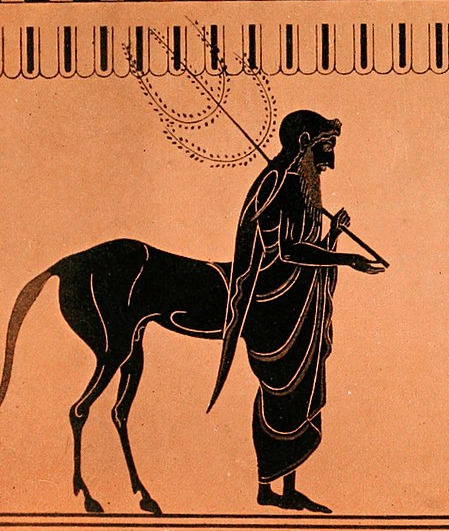

Chīrōn / Χείρων
Chiron
(Fons Imaginis.)
#Chiron#Cheiron#Kheiron#ClassicsTober#ClassicsTober23#latin#latin language#latin translation#lingua latina#tagamemnon#latin fandom#paradigm#paradigms#latin paradigm#latin paradigms#declension#declensions#latin declension#latin declensions#Greek#Greek language#Greek translations#lingua graeca#Greek paradigm#Greek paradigms
38 notes
·
View notes
Text
The Time Paradigm [II]
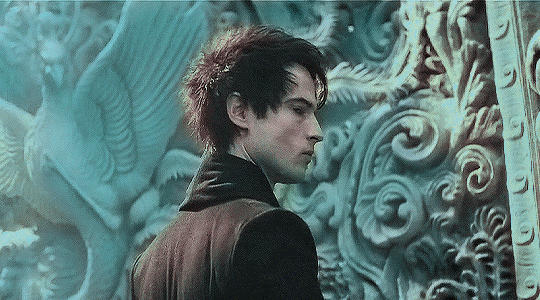
pairing: Dream of the Endless x fem!reader
summary: a fuzzy dream of love and (un)holy consequences
warnings: slight gore, language
word count: 1.7k+
Enter the Dream, weary traveller
Chapter II: A Grecian Dream of Hospitality
As an active member of the Dreaming and a rather... pro-active member of the King of Dreams’ very own circle, she likes to think she has known her fair share of nightmares.
The Corinthian comes to mind, pale head and ominous shaded glasses, expensive cars and the heady scent of falling ash. Sparkling stardust and swirling rainbows wash it away with a draught, the lingering residue energy of a well-meaning Nightmare-turned-Dream left buzzing in the ether. Gault, Eve herself, the ever-patient Abel, the angry Cain, Fashion Thing, Merv, Lucienne, Matthew, Gilbert…
She recalls their names one by one, like a tether grounding her home.
Dreams and Nightmares and then some.
For a fleeting beat, she wishes they were here, stalking in the confines of her barren mind. But at the moment, her disoriented sense of self is without a doubt free of all these friendly faces.
It runs wild, bending under the force of an unknown entity—something fierce and angry that has not yet been crafted by the Dreamlord's vengeful hands. Something she is brewing on her own, but all sense of pride eludes her.
She hates this—only vaguely, so dazzled is she, for the bigger part of her exhausted soul is lost to any plane of existence. She remembers vague things, lost feelings and Dream Kings, washed away by the sea salt that tickles her nostrils, and the warm breeze she feels sweeping across her face.
These-things, concepts, thoughts, simple pleasures, simple tortures- offer her little solace in the passionate frenzy of her seizing being.
She tosses, turns, curls and unfurls, all at once, limbs straying, snapping in all sorts of painful directions until she is certain nothing remains of her but her terror-stricken screams bouncing off the impossible walls.
The worst of the worst follows quietly, like the dark menacing living vines she'd observed creeping towards a gingerbread house in a stranger’s dream. They swallow her whole, pinning her in place, and suddenly, they’re everywhere—in her boiling bloodstream, descending a churning stomach, growing in raw lungs, pulling at her heartstrings.
I don’t want to die. Not like this. Not without him. Not without seeing him again.
Her body stops thrashing.
The crooked vines release her slowly.
She settles on her very own cloud.
In the eternity she feels go by, her breathing stills, her heart swells and her forehead drips, glistening with fever-induced sweat.
Addled, bed-ridden, the words ring in her mind when she opens heavy eyes, eyelids nearly sewn together by lint and disgusting remnants of exhausted bodily fluids. Figures move about the room, shuffling with purposeful pride, stalking towards her, and she barely has time to jerk her body upwards before a pale hand connects with her scalding forehead. The hand retreats, falling back against a woman’s side.
‘’Who-‘’ she begins, choking back a sob at the excruciating pain washing over her, mind, body and soul.
‘’Fear not, dear Traveller,’’ gilded words pour over her fever-addled brain like honey on a hot bun. ‘’You are safe.’’
Her eyes trail over her own form, the stranger’s words and their meaning eluding her entirely.
Her tattered shirt lays bunched about her hips, split right in the middle and tossed back in a careful tear, displaying her grey brassiere to the world.
Death. For all involved.
She scrambles to cover herself, releasing another pained gasp at the slightest turn of her head. The turn gives her incentive to take in the new room.
A gargantuan bedroom, she realises, furnished with two unnecessary tables, carved armchairs, velvet knick-knacks whose names elude her and a large four-poster bed; her fluffy cloud.
She rests upon the silk sheets, staring at herself in the oblique mirror framed on the opposite wall. Fortunately for her, them and everything else, nothing is left of her rage.
Nothing is left of her, really.
Nothing but a shirt in disarray, frayed jeans and heeled boots pushed neatly against one of the bedposts.
Blue-ish spiderwebs stretch below her eyes, forking a crooked path to her pale cheeks. Her hair looks as though five birds have fought over sovereignty of her tangled locks and a scarlet streak catches her glare in the gross reflection.
Blood.
Ugly, dark and impossibly fast oozing blood.
It pours from a cut rippling across her exposed abdomen, tiny drops bleeding through a white cloth. Disgusting, mostly because it looks cooler in the movies and less... smelly.
Triggered by the leaking wound, pus and blood and pus and more blood, it all comes back to her in a flash.
The endless corridors.
The gold.
The white.
The black.
Dream.
Morpheus.
Love of her lives.
Bleeding, struck, defenceless.
Anger, hot, blistering, all-consuming.
The delicious contact of skin on skin.
Bare.
Instinct.
A flaring burst of pain in her back, her stomach, her heart.
His eyes, fathomless, swirling with infinity and… something else. Something she can’t remember.
Other things, fragments following a dazed darkness.
Haste. Discontentment. Warmth. Frost. Buzzing. Tearing. Mending. Pouring. Screaming.
Through the screams, the faintest utterance of his name. Repeated. Until a hand chases hers and never lets go. But it did let go, for upon awakening, she finds herself in this room, in the presence of naught but this stranger.
Then, for the very first time, her eyes lift to her taker’s face.
She’d be convinced she were dreaming, had she not known all the Dreaming’s worlds by heart.
But by Night, this woman is delightful. Beautiful. Ethereal, even. A goddess if she’s ever seen one.
Long, auburn ringlets frame the soft sides of her round face, falling over defined shoulders and gracious curves accented by a ravishing white dress. Her eyes shine some mixtures of brown and golden-amber, but her hair alone is a marvel.
Her smile is kind, motherly, sisterly and everything in between; so dazzling, in fact she can’t tell her age.
Our heroine, though she fits all the standards and expectations for one such as her, feels adequately underdressed, underwhelmed, under-everything. Beneath, if her pride could but just say the word.
‘’Are you the sun?’’
Her laugh is pearly, ricocheting off the walls with bubbling precision, the sound alone nearly blinding. It makes her want to laugh too.
‘’I thank you for your confusion.’’
‘’What?’’
‘’Precisely.’’ She laughs again, politely, smile hiding behind a pale hand. ‘’I cannot think my brother would take too kindly to that.’’
‘’I don’t-mmph!’’ The interruption resembles a pained groan, tearing her from the inside out, along with the dragging piece of cloth taped to the gaping wound in her stomach. ‘’Fuck.’’
‘’It is quite the toll the wound has exacted on your body,’’ comes the soothing voice, and she notices a slight tremor between the is and the quite, acknowledging it for what it is. The beautiful woman bears an accent.
‘’What I get trying to be a good g-‘’ her words die in her throat, shoved down her stomach in a heavy ball. One digging thought accounts for all others. ‘’Dream.’’ She glances around frantically. ‘’Where is he?’’
Amber-brown eyes blink, a hand coming to rest on her shoulder comfortingly.
‘’Fret not, all is right. He owes you a world of thanks, but you might die before you see its beginning.’’
She shakes off her comfort with great difficulty. ‘’What does that mean?’’
If she is bothered by the sudden turntable, the beautiful being shows no sign of protest. Instead, she gives another rueful smile and all but glides to a buckled chest at the foot of the bed.
‘’It merely means that the Dream King is not quite ready to admit the admittable.’’
‘’That’s not a wor- wow.’’
‘’Ah, yes. It is always like this the first time, isn’t it? Are you an envoy as well?’’
The words barely register. They’re fleeting, non-existent, mouse-scratches against a wooden door spoken on an entirely different plane.
That is the only reason she comes up with.
The only explanation there is.
Yes, that must be it, the words and her eyes are a hundred worlds apart.
The words are too light, too bland to belong to anything her eye can see.
And yet bland, dull words skip over a plethora of splayed clouds, stretching beyond the wide windowpane, beyond the sky’s limit.
Limping, she makes it to the window before she can even realise she’s moved, faint protests bouncing off the ether behind her, her own breath mingling with it and the rest of the cosmos.
Actually, the rest of the cosmos be damned. She’s lost her marbles. Stomped on them and then dropped them in a volcano; whatever, whichever, whenever.
Just simply, completely, positively insane.
Deprived of her beloved, deprived of life and air and all this is nothing but a fevered nightmare and she’s probably passed out on the second floor teenage neighbour’s doorstep, bleeding into their Well, come mat.
Her fingers poke at the wound in her stomach and she flinches, confirming the impossible truth. She, this, is real. She’s standing on a building built on a blanket of clouds and having a panic attack in an IKEA and dying in the fucking sky—
A warm pressure settles on her shoulders, grounding her where she stands on wobbling legs. ‘’Mount Olympus,’’ she surmises. ‘’In case you were wondering.’’
She wasn’t. She really, really wasn’t.
Dreams and Nightmares. Fantasies and realities. Gods and the Endless.
The former had begun to wane, had explained Dream himself one particularly chilly evening spent exploring Dream Country. Spurred by forgotten beliefs, kept alive by the few remaining myths, gods and goddesses were dying. They were nearly all twelve feet underground, not lounging on velvet couches in the sky.
‘’Dream?’’ She tries, barely croaks out with her breath fogging the glass screen—no, not glass, not a windowpane, something else, something godly, infused with the magnetic pull of divinity.
‘’Oneiros will be with you shortly. In the meantime—sleep.’’
She has little time to recognise anything else before the hand is forced on her mouth, dragging across her parted lips and pushing something the size of an acorn inside and then, she is lost to this world.
The comforting touch on her shoulders never falters.
She begins the search for her heart in Chapter III: Rara Avis
#the sandman#sandman#dream#dream of the endless#morpheus#dream x reader#morpheus x reader#the sandman fanfic#the sandman au#the sandman x reader#no y/n#dream of the endless x reader#the dreaming#lord morpheus#greek mythology#dream x you#time travel#writer might know where she's going#the sandman (2022)#the time paradigm
65 notes
·
View notes
Text
sc below:
-----
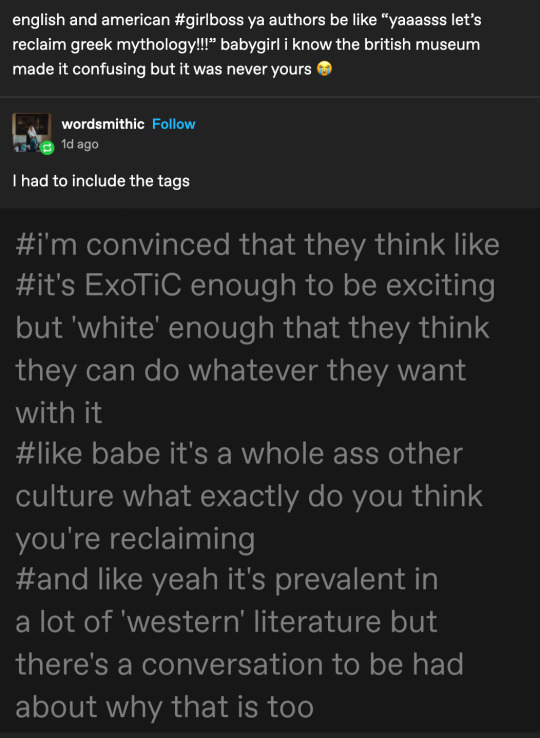
polish people are culturally appropriating from rome by being catholic. english-speaking people are culturally appropriating from france by having romance words in our language. irish people are culturally appropriating by speaking english. MAKE IT STOPPPPPPPPPP

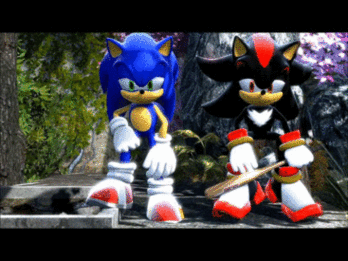
#the op is italian thats why lOLLL#today on the white europeans try to claim to be oppressed by other white europeans circus show#Said's critique as to the incorporation of classical culture by western imperialist societies to prove their legitimacy#and some of the contradictions inherent in that which should be exploited to undermine the whole paradigm is a different conversation#but very much not the conversation thats being had here#same vibe as when neopagans are like u cant write stories about the greek gods thats our RELIGION#i hate how posting a screenshot can look like its ur own post sigh i WOULD NOT SAY THAT
15 notes
·
View notes
Text
Gaza, that ancient city on the eastern shores of the Mediterranean, has come to be the political and moral compass of the entire world. Despite the pervasive destruction, Gaza stands not as a place in need of lessons. Instead, it is itself the poignant lesson of our modern age – a litmus test for humanity. As the death toll continues to rise, it becomes increasingly challenging to conceive of a violence more profound than that inflicted by machine guns and aerial bombardment. However, Israeli colonial violence – both in Gaza and Palestine more broadly – has historically manifested at various scales. It extends from the confines of a bedroom to encompass a neighbourhood, a whole city, and stretches to the scale of a regional geography.
Understanding the destruction of Gaza calls for a dual perspective. It requires zooming in on the intimate scales of violence while also being aware of these broader manifestations. At the core of Israeli colonialism in Palestine is the logic of partition, a paradigm fundamentally at odds with the land, its people and its history. Gaza has long been a nexus of interconnected worlds: for millennia, it served as a vital crossroads, connecting Palestine to Egypt and bridging the continents of Asia and Africa. The roads from Gaza to Bir al‑Sabe’, Jaffa and Jerusalem have witnessed the passage of visitors, merchants and pilgrims from diverse corners of the world. The city’s social, cultural and economic prosperity has been woven into its geographical openness, a defining feature in Palestine’s long history. Any thought about Gaza and Palestine’s future is bound to reckon with this history.
The enduring imprints of Gaza’s geographical openness are discernible in both its social and built fabrics. This ancient city has witnessed the rule of various empires and civilisations, including the Egyptian Pharaohs, Greeks, Romans, Byzantines and successive Islamic dynasties – each contributing to the rich tapestry of the city. Gaza is home to historic treasures such as the Anthedon Harbour, the port that linked the city to the Mediterranean world in the Roman era; the Great Omari Mosque, one of the most significant mosques in Palestine; and the Church of Saint Porphyrius, believed to be the third oldest church in the world.
These historic landmarks, among residential buildings, universities, museums and cultural institutions, have not escaped the intentional targeting and destruction inflicted by Israel. In essence, these sites embody all that Gaza stands for and Zionism doesn’t – geographical openness and historical continuity. In historical terms, the 75 years of Zionist domination in Palestine represent an anomaly, as Gaza and other cities have perennially thrived on cultural diversity and interconnection.
111 notes
·
View notes
Photo
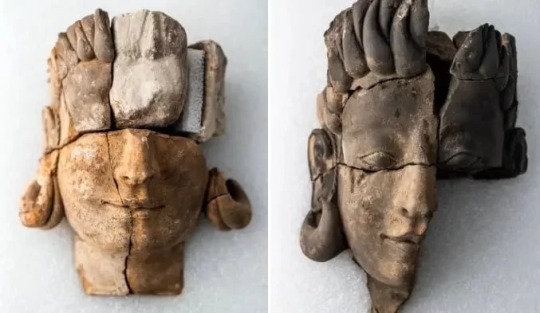
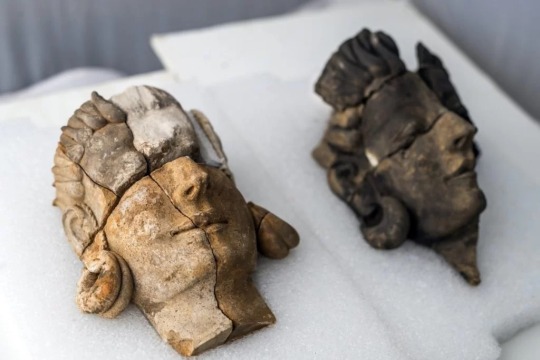
First Ever Human Depiction of Lost Tartessos Civilization Uncovered in Spain
Archaeologists representing Spain’s National Research Council (CSIS) excavating at the site of Casas del Turunuelo have uncovered the first human representations of the ancient Tartessos people.
The incredible results of an excavation that shed light on a mysterious and ancient civilization that flourished in southern Spain several centuries before Christ have been presented by Spain’s National Research Council.
The Tartessians, who are thought to have lived in southern Iberia (modern-day Andalusia and Extremadura), are regarded as one of the earliest Western European civilizations, and possibly the first to thrive in the Iberian Peninsula.
In the southwest of Spain’s Iberian Peninsula, the Tartessos culture first appeared in the Late Bronze Age. The culture is distinguished by a blend of local Paleo-Hispanic and Phoenician traits, as well as the use of a now-extinct language known as Tartessian. The Tartessos people were skilled in metallurgy and metal working, creating ornate objects and decorative items.
Archaeologists from Spain’s National Research Council (CSIS) on Tuesday presented the amazing results of excavation at the Casas de Turuuelo dig in Badajoz, in southwest Spain, as well as the results of the excavation.
Five busts, damaged but two of which maintain a great degree of detail, are the first human and facial representations of the Tartessian people that the modern world has ever seen.
The ornate depiction of the stone busts, as well the inclusion of jewellery (hoop earrings) and their particular hairstyles, resemble ancient sculptures from the Middle East and Asia.
These “extraordinary findings” represent a “profound paradigm shift” in the interpretation of Tartessian culture, excavation leaders Celestino Pérez and Esther Rodríguez said during the press conference.
Given the scarcity of Tartessian archaeological finds thus far, this ancient society is shrouded in mystery.
Tartessos’ port was located at the mouth of the Guadalquivir river in what is now Cádiz, according to historical records. In the fourth century BC, Greek historian Ephorus described it as a prosperous civilization centered on the production and trade of tin, gold, and other metals.
What is unknown is where the Tartessians came from, whether they were an indigenous tribe with Eastern influences or a Phoenician colony that settled beyond the Pillars of Hercules (the Strait of Gibraltar).
The team from Mérida’s Institute of Archaeology believes two of the busts discovered in what is thought to be a shrine or pantheon represent Tartessian goddesses, despite the fact that Tartessian religion was previously thought to be aniconic (opposed to the use of idols or images).
The stone busts’ facial depiction, as well as the inclusion of jewelry (hoop earrings) and their specific hairstyles, resemble ancient sculptures from the Middle East and Asia.
Archaeologists believe that the two goddesses, along with three other sculptures that were significantly more damaged, were part of a stone mural depicting four deities watching over a Tartessian warrior, as one of the defaced busts has a helmet.
The ornate effigies, which are thought to be around 2,500 years old, are also significant for art historians, as Ancient Greece and Etruria (an ancient civilization in modern-day central Italy) was previously recognized as the epicenters of sculpting during this time period.
By Leman Altuntaş.
#First Ever Human Depiction of Lost Tartessos Civilization Uncovered in Spain#Casas del Turuñuelo#ancient artifacts#archeology#archeolgst#history#history news#ancient history#ancient culture#ancient civilizations
292 notes
·
View notes
Text
Hyunjin fic recs 2
stray kids | Hwang Hyunjin
masterlist | part 1
[ updated 240228 ]

5:15 am { f } @dreamyyeosang
cliche meetcutes { f } 0,9k @chvrrycola
04 sharing haring a bed series { f2l, s } @skzdarlings
Ice { mafia au, strangers2l; a, s, f } 4,5k @healinghyunjin
Sheer good looks aside though…you’d seen his face on the news. What was his name? You remembered that it was something elegant, soft on the lips - a name that didn’t seem to fit the cruel, hardened mafioso it belonged to.
It was only when those cold icy eyes locked with yours, gaze chilling even from all the way across the bar, that it finally came to mind.
Hwang Hyunjin.
kinktober day five { f2l; s } 2,5k @gimmeurtmi
uni student hyunjin but make it art
9:02 A.M { f } @forlix
Read between the lines { f } 0,5k @inkelea
Making out in a car { s } @astraystayyh
are you bored yet? { insecure y/n; a, f } @ebbaskz
“but i can’t help from asking ‘are you bored yet?’ ”
I’ll make those insecurities disappear { a, f, s } @lotus-dly
Taste { s } @moonjxsung
Sunday’s Paradigm { f2l, college; f } 2,6k @sunboki
He was a cold person. Spiteful and brash to all people too close, scared to let his walls down. Except, to him, you’re a spectacle. A classmate he realizes he can’t exactly find reason to dislike while he sketched you from his stool in the art room.
The deal. @hyunedew
the one where you accidentally summon the king of hell in your pursuit to pass your class.
Pendulum { f, a, s } 1,2k @1-800-shedevil
You visit Hyunjin on the night of his big art exhibit intent on closing this chapter of your life but he's not willing to let go that easily.
Say yes to me { f } @astraystayyh
after your seven minutes in heaven, hyunjin wants to plan out how he'll finally confess to you. except you come knocking on the door of his rented cabin unannounced. at 10:53 pm. the perfect time for love, he comes to learn.
Bound to You { Cerberus, Goddess, Greek Mythology; f, s } 4,3k @winter-dayz
“What are we?” { f } @jinhyun
Drunken with a sense of love { drunken confessions, fake dating } 7,1k @hanibalistic
you and hyunjin got drunk at different times, and you two took care of each other similarly.
Thinking about how attentive hyunjin would be when you’re sick { f } @seungminhour
Christmas Eve with Hwang Hyunjin { f } @agi-ppangx
Eight days of Christmas carols - day 4 { f } @rachalixie
Pussy agenda with Hyunjin { s } @fluffylino
Sigma kappa zeta’s olympic level beer pong team { + Innie x reader; s } 7,2k @/skzms
it's the last frat party before winter break and you, hyunjin and jeongin have a title to defend. who knows where it might lead (we do, it leads to the three of you smoking weed and fucking in jeongin's room)
9mitm { s } @straykeedz
Babysitter.com { single dad Hyune; s, f } @mnwrld
hyunjin's whole life changed when his daughter was born--it was the single best day of his life. but parenting was harder than he thought it would be, especially when he also needed to work to be able to provide for the light of his life. maybe a little help wouldn't hurt? where else could he look but the notorious 'babysitter.com' ?
Series
devil by the window { DemonxAngel; s } 3k @berryjoong
you’re an angel, hyunjin’s a demon, and you’re both after the same soul. you hate each other, but you just can’t stay away from him.
part two { f, a ,s } 6,4k
the strange man of monterrey manor ( series ) { vampire au; f, s, a } @quokkacore
chapter one: a marriage most foul
chapter two: voices that wail in the night
chapter three: a solution to the issue at hand (m) [final]
Make Love, Not Porn { s } @charmercharm3r
You crave a life of normalcy, he craves you. And he'd do anything to keep you, even if you're for the world to see.
Play Time 3,8k
Heat Signature 5,9k
Puppeteer 4,3k
Hi, My Name Is 7,7k
Sunday 6,7k
Texts
Boyfriend texts @like-a-diamondinthesky
Boyfriend texts @gyuworm

Note: please let me know if the links are not working ! I’ll try to fix them as soon as possible ^^
#stray kids#stray kids masterlist#stray kids fluff#stray kids smut#stray kids angst#hwang hyunjin#hyunjin angst#hyunjin smut#hyunjin fluff#stray kids recs
124 notes
·
View notes
Note
i'm so happy you loved my fanart ! I wonder, what is your headcanon for Apollo/Lester height ? I love to imagine Apollo around 175/180cm and Lester around 168/170cm. I want him to be kinda smoll, because he is a baby
Well, I'm a filthy American, so it took me a second to figure out what this meant lmao. I see Apollo at 5' 10'' (178 cm) bc that's the average height for men in Greece, and he's the greek paradigm of manhood and whatever. As for Lester? I really base it on who I want him to be shorter or taller than. So like, he's taller than Meg, Hazel, and Rachel, but he's shorter than Frank, Jason, Percy, Reyna, Jo, Grover, and like, basically everyone else. I'd say he's closest in height to Leo, so probably like, 5'4'' to 5'6'' (164/170cm)
Basically I think we agree on this lol.
63 notes
·
View notes
Text
Tragedy at an Impasse: The Terror, Hope, and Loss
Or a series of digressions about the story's themes of hope and some of its manifestations.

Once upon a time, a Greek chorus would sing upon a spectacle, and before then, and ever after, tragedy would fascinate us, because it would call to our familiars, because we, too, live with regrets, on a stage with little control over our fate, where we are nonetheless festering hope, a speck of something unattainable, a longing for what we may have once dreamt as familiar, as safe, as right.
There is no chorus in The Terror, its music is haunting, quiet, and acute. Like a good tragedy, its beginning already spells its doomed end, but its theme is silence. How then, should one replace the chorus, how can one call for fear and mercy, which muse should sing for them, rotten as they are, lonesome as some vowed to be? Its characters are left bare, but few of the self can be recognised through their exposed thinning flesh and frail whimpering. They are no geodes, expecting to be broken, to reveal a truth only their God would lay claim upon 一they’re Heraclitus’ paradigm of the shifting river, Theseus’ ship, and they are gone. Dead, and gone.
They are a graveyard of hope, with no bones to be buried. It begets grief and resistance, in their path laden with loss and futileness. The Terror is a tale of hubris and loss, of unfairness upon silence, of humanity bereft of it. Hope, too, is bereft of itself —but it does not die until they all do.

I. Devotion
On occasion, the characters pour hope into their devotion. After all, the men of Erebus and Terror cling mostly to the way of the lands they leave behind.
Far from the waylay ships and their forsaken fates, they hang on to the faith of their merciful God, whose scripture should stand above all laws of men. Here? There is no place for the divine. Not for them. The land, they soon see as godless, as it is put under prejudice, as they try to conquer that which is not theirs; soon it is godless, as human law and debauchery attack it, and thus God cannot love them. Their faith, and thus their hope, cannot reach him, if he is there.
Forsaken, what is God to them? He who loves them not, and in whose stead Fitzjames raises Sir John first, then Crozier?
Like Irving, the men who know the gospel in their hearts doubt and suffer, but they find contentment in that divine law, in its order. That God would not grant them ghosts. There is no more content soul than that of the most pious devout, and that of those who deny religion and gladly accept it in their heart. To Irving, faith was enough, as he upheld 'propriety' at the ships. It was enough, as he trudged atop the ice and the steppes. It bloomed, when hope was granted by chance, as a meeting with the Netsilik, as the goodwill of humanity was rekindled before his eyes. Freezing, devoted, doggish Saint Bernard that he was, it is still known: tragedy fancies not a mercy to devotion, to faith.
God-fearing Franklin and David Young cling to faith, when they feel their passing near. Perhaps, convinced by Goodsir, Young would fashion himself a more fortunate Icarus, even when his wings he did not will himself; why would he not wish to be anything other than a canary in a coal mine, after all? Perhaps, Sir John fashioned himself a Robinson Crusoe, that God would say to them that “As I was with Moses, so I will be with you; I will never leave you nor forsake you” (Joshua 1:5). Perhaps, but God is not there for them.
Even then, when Goodsir claims it does not matter if God is with them, it matters to some, it matters to Hodgson, and Fitzjames, who gnaw onto its hope and meaning for salvation, for legitimation. Hodgson equates the Holy Communion to human consumption, he incarnates the horror that Dante appealed to with Count Ugolino and his purposely ambiguous verses, and he hopes, or rather wishes he hoped, that this faith will preserve his humanity, as the body of Christ preserves life, because he is hungry, and he wants to live. Fitzjames, in its stead, plays his subtle counterpart, he plays Ugolino’s sons, he pleads to give back to those who believed his performance more than he did, and he cries, to Crozier, who ‘loves the men more than God does’, “Father, much less pain ’twill give us / If thou do eat of us; thyself didst clothe us / With this poor flesh, and do thou strip it off. / Then hunger did what sorrow could not do” (Canto XXXIII, Inferno). Indeed, he is not Christ, but his body he will offer.
Hope, thus, is named faith, in the name of Christ, the son of the absent God, ripped apart like a Dionysos by men hungry for his love, when hunger did what sorrow could not.
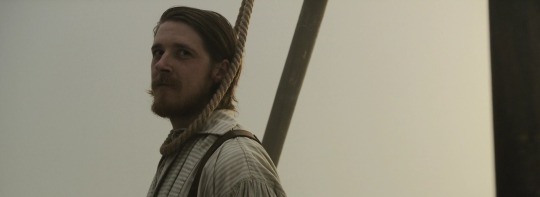
II. Consumption
Could we say, then, that hope is consumption, in the human need of possession, the desire of life?
The crews find little wonder in this place. They wonder only of below, of forward, by Franklin's ghost. Life can bloom, one can find beauty in Nunavut, Goodsir learns, and Silna mourns, but the other sentenced men see only a barren land. The hollow land, for hollow men.
Hope turns some to forbidden consumption, to harvest corpses for the life that does not bloom in them, and it is both the epitome of Arendt’s banality of evil, that “wholly unexceptional complacency” (Eichmann in Jerusalem) that waltzes into horror, and an act of fear and unrequited understanding, unrequited love.
It is said that “incorporating what you love is a sure way of seeing that it never escapes from you” (Crain, 1994). It is no wonder that he who has nothing would want to consume everything.
Rat, vulture, prophet, devil, monster, chosen, no one, ‘Hickey’ 一neither of which he is. Few understand hope as Hickey does. Hope is whatever one makes of a bad situation. Hope is survival, and “survival is a nasty piece of business. But we do what we have to do.” There is no troubled complaisance, because this force of life, this meaning, is owed to the possession of something, anything; it is feeding from the possibility of having a place and a meaning in the great scheme of it all.
This curse may leave them loveless, may leave them unconsumed by the recognition of the other through their ever-decaying humanity, but Hickey opens the door to hope through consumption. No more would they be shown “fear in a handful of dust” (The Wasteland: The Burial of the Dead, TS Eliot), but rather, a new life from it: a utilitarian Noah's ark of mutineers. Or the attempt of it.
Because Hickey scraps from meat and its ornaments, he dresses in that which the world knows he is not, in the boots of a man who must stand to the view of all or believe himself no one at all, in the coat of a subservient man who forced him to expose himself for the 'godly' concern of ‘dirtiness’ —but Hickey is no Dr. Jekyll. He is both sinner and sufferer, but cannot conjure a Mr. Hyde. He cannot become someone else, someone born with different circumstances, someone beyond tragedy.
But hopeful, of his powerful change of fortune, he must have felt. Hopeful that the intimacy of anthropophagy and lust —and perhaps even love— would fill him as they should, that he would be seen and loved by a place through which he only works if it is to mingle with the dead… but this place, this barren, hollow, wasted land that they have made, cannot love them back. It cannot love Hickey back, no matter how much he hopes so.
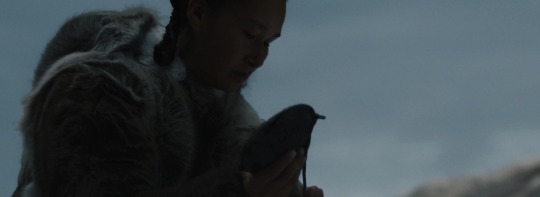
III. Legitimacy
Hope is born out of recognition, a yearning that could not be wholly unreal, that there may be no certainty, but still a possibility of that desire, and a strength to see it through. As such, hope calls for an act of mercy, in repentance and debt, a hope for meaning and order; hope longs for foresight, as it guides the defeatist soothsayers to silent survival.
Mercy demands a hierarchy, a higher power and a higher moral, and what claim do these downtrodden souls have on such exercise? What right have they, to instil upon their lot the pretence of order they left back on their homes? What legitimacy have they to cry for Lazarus, his grave either sealed or in the making?
If hope is survival, if hope is in the rightness of humanity, and the purity of the flesh, it gives, that the physicians would dare all they did, a vow to knowledge, a vow to wellness ーthe burden of mercy. It is telling, then, that Stanley and Goodsir’s sentence is set from their very own sickened flesh, when their soul can no longer be contained, when it cannot bear to heal what is thought lost. Song is lost, through Morfin, and so is fellowship, through Collins, and truly, what remains of man by then?
Soon, they will be husks, there is no other end to life and their sentences. Three roads stand before them: they may seize all banal struggle, end it here before hope eats itself; they may push forward, wait for someone to take up the torch while they impossibly keep its fire alive; they may also cut expenses, maximise the chances of the fortunate few. Le Vesconte chooses the latter, to Little's dismay, but truly, nothing is fair where they are. The ill shall die alone, but they, too, already are "dead and gone", and damn it all ーthey still hope to live.
Theirs is an act of love, a hope that their mercy might make it right, but, ultimately, they are no God, and they cannot command the choice of their men. They cannot play Abraham nor the shepherds, because they are Cain, indeed, their brethren’s keepers, and the death they plan is also the death they hope to inflict upon the lead and the fear that is slowly sentencing them.
This is a truth that they know all too well, but few more than Silna and Crozier do, soothsayers, voice in the wilderness, shamans that they are. They have the certainty, and they suffer the curse of Tiresias and Cassandra, of an Orpheus who shall see his darlings leave when he remains, and whose cries shall be for naught but a sad song with no words.
And Crozier shall drown in the alcohol and the visions of a David who will be thrown to the lion's den and survive it, yet he will long for that spiteful hierarchy of patronising mercy, in the mistrust born from others’ devaluation of him —but Silna shall be a symbol of the suffering that colonial enterprises inflict upon the innocent. She shall bite that “We were never meant to survive” (A Litany for Survival, Audre Lorde), but why would they not leave, why would they not let her bury her father, force her to play Antigone? Why are they tying her down with them, making her Lady Silence? And, to Crozier, “Why do you want to die?” Why— why would he kill hope, why would they make her home a boneyard?
And, far removed from who they were, exiled from their homes, both shall inflict a silence upon their legacy, and enact the aftermath of that hope.
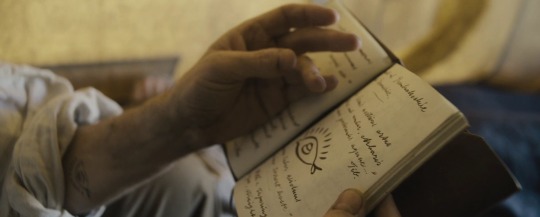
IV. Hope
What value does hope have, if this is an inked and parched tragedy? What goodness is it, when loss is assured, faith is unheard, consumption fills no well, and mercy is not merciful at all?
Most died, and there were innocents back in the graveyards they left behind, as there were innocents in Sodom and Gomorra. Faith and trust are gone, and so is warmth, while love is frail. Hope is at odds with itself, it is both a noble promise and a delusion, and it is the trembling gun that points not to the narrative’s back, but to its chest, cold, heavy, knowing, undoing. That particular gun should fire, it would be right, but a certain lieutenant wavers, does not pull the trigger, because he hoped— He hoped it did not have to be like this.
A question is thrown to the skies, from sore, tender hearts: “Why?”
The veterans remember well, ‘why’. Before their minds were touched by darkness, “it wasn't sickness or hunger that mattered most to our chances.” Instead, as Mr. Blanky relates, “what little love we had amongst us was the only thing keeping us civil”, and Blanky speaks not only of the story of Fury Beach, but also of their very fates.
If hope is to be the compulsion to bite the hand that feeds, to split its head open with a boat axe —if hope is to be a stronger faith in the others, or the self, than on living on, then so be it.
To hope against hope, in the face of silence, of loss, is worthwhile, and it is allowed, Blanky proves, as he discovers both the Passage and Tuunbaq by his own, lonely path. Then, hope needn’t be of survival, it needn’t be of a cleansed state of naïve, optimistic utopia. Ephemeral as life is granted to humanity, I’d dare say we are allowed this, to hope not only in spite —but because of death.
Because of death, the Netsilik family that feeds Irving matters —because of it, the efforts Lady Jane pursues back in England matter —because of it, Collins, Hartnell, and Tozer’s care for their fellows matters so, even as it leads them straight to their death.
Because hope is restless, and it cares little for tragedy when tragedy cares so much for it, it lives on, and it instils upon the bystander the chance of that bittersweet, wonderful catharsis.
Hope punishes Jopson, due to a frenzied servitude and loyalty that is paid in the botulism-induced disbelief of abandonment, but it pushes him forward, too, closer to the open than to the living dead the tents guard; hope chokes Little through angry chains and a last command, it reduces him to puppetry, but it pushes him to a subtle integrity few are allowed, and something must remain at the very end, to ask ‘Close?’, and thus hope for an answer, if it mattered, in the end; hope tells Bridgens love is what life is worth being alive for, and he’ll want for nothing else when Peglar’s gone, but he guards the pocket-book to his waist, he keeps his lover's words close, closer than his own, and he hopes not to die an empty book.
Crozier speaks without a waver, through words that haunt The Terror till its very end. That “‘close’ is nothing. It’s worse than nothing. It’s worse than anything in the world.” This is a tragedy, there is no happy ending. But ‘close’ does have a meaning. ‘Close’ means ‘hope’, and hope is the remnant in Pandora's jar, to which they were so close. Hope is what made them, once upon a time, alive, and hope is why it hurts.
If you reached the end, this is an invitation to talk about the hyperfixation together 🤝
#the terror#meta#long post#i really needed to write about hope and end it on a positive note. it mattered to me -perhaps it might matter to other terror fans (?)#inspired by conversation with @even-in-arcadia!
22 notes
·
View notes
Text
Current nonfiction reading is The Family in Greek History by Cynthia B. Patterson (Harvard University Press, 1998). Ever since the nineteenth century, a prevailing paradigm in Greek social history has portrayed the oikos (family or household) and the polis (city-state) as having been in tension, with competing claims to authority that could sometimes erupt into open conflict, as e.g. in Sophocles' Antigone (where Antigone's loyalty to her brother opposes Creon's state decrees). Patterson, an expert on Greek law, argues forcefully and cogently that this paradigm is flawed, a product of mistaken assumptions about ancient social evolution. She prefers, following Aristotle in the Politics, to see the oikos as a fundamental building block of the polis, recognized as such by ancient legislators who codified "proper" family relationships into law. I'm honestly not sure whether I'm qualified to judge every facet of Patterson's argument--her knowledge of Greek law runs rings around my own--but I've been very impressed by her analysis of the family in the Homeric and Hesiodic poems. She's a fine close reader, and unlike some scholars, she pays attention to what the texts actually say rather than what she would like them to say. If nothing else, she's encouraged me to rethink many of my assumptions about ancient family structure and gender roles, which is a valuable service in and of itself.
31 notes
·
View notes
Text

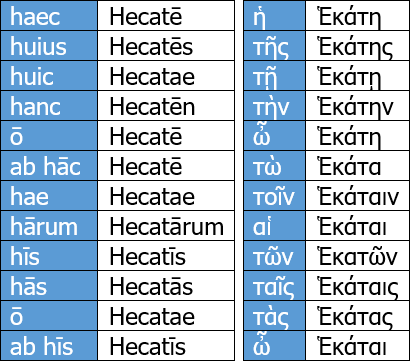
Hecatē / Ἑκάτη
Hecate
(Fons Imaginis.)
#Hecate#Hekate#ClassicsTober#ClassicsTober23#latin#latin language#latin translation#lingua latina#tagamemnon#latin fandom#paradigm#paradigms#latin paradigm#latin paradigms#declension#declensions#latin declension#latin declensions#Greek#Greek language#Greek translations#lingua graeca#Greek paradigm#Greek paradigms
33 notes
·
View notes
Text
The Time Paradigm [V]
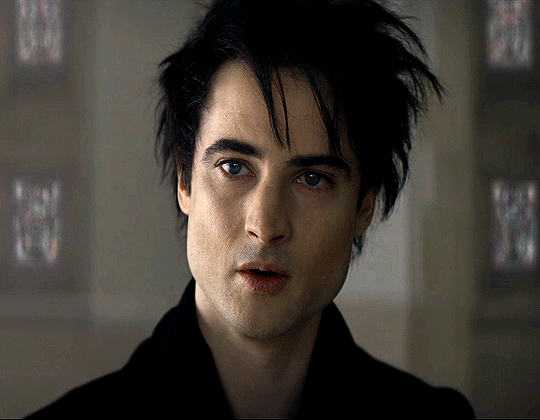
pairing: Dream of the Endless x fem!reader
summary: questions, betrayal, answers and the love of a good dream
warnings: gore, allusions to smut, reader is horny?
word count: 3.8k
Enter the Dream, weary traveller
Chapter V: Library of Everlasting Deceit
As first centaur on Olympus, head chirurgeon and occasional husband of a demi-god, Chiron has seen more than what the whole of creation entails.
And yet, when she finds him in his anteroom, sharing her odd request, he finds himself rethinking his lives.
‘’You expect me to do what?’’
‘’Open it up. Pop it open, whatever, however.’’ She says simply, leaning back against a bookshelf stationed behind her stool.
‘’Open you up, you mean?’’
‘’I’m not familiar with the logistics. Just do what they do on CSI.’’ He blinks, drawing a sigh from her. ‘’The Closer? Forever? IZombie? I’m running out of relevant examples if it isn’t obvious.’’
‘’You are indeed a strange girl. But you are mad, if you think I’m going to do that to you.’’
‘’I would do it myself but I don’t know how. What’s this for?’’
A flash of silver shimmers under the sunlight—he snatches it from her curious fingers just as quickly. ‘’Just the scar, then. But only because you’re a menace to yourself and others. We should have you in chains.’’
‘’Kinky. Why no stitches?’’
He gets to work, slowly peeling the bandage off. ‘’The wound itself seemed—what in Tartarus?’’
‘’Like I ate Wonka’s chocolate bar, wrapper and Golden Ticket included, I know. On the plus side, my entrails could easily pay off five student loans. Probably only just one—come to think of it.’’
‘’As a doctor, I strongly advise you to leave and see it cleaned but as a man of science…’’
‘’Come on, Doc. I know you’re just itching to do it.’’
His bespectacled eyes lift, a sheen of maroon beads shimmering with curiosity. She knows victory.
‘’Only just a little then…’’ he mumbles in his heavy beard. Between one blink and the next, he holds the same strangely-shaped tools she couldn’t name to save her life. She ignores all dutifully save for one that looks an awful lot like forceps; it bears the same icy cold feeling when it skims across her torn flesh.
‘’What’s that for?’’
Sensing her sudden unease, he feeds her the directions one by one, explaining his ministrations as clearly as possible, after which he provides a drink of sorts and lets her lay down, exposing her broken skin and trembling eyelids.
‘’Are you hurting?’’
‘’No, no it’s okay. I don’t feel anything. Not a fan of blood though.’’
‘’Are you squeamish?’’
‘’Not squeamish, just… sensitive,’’ she groans, the tell-tale of clanging things and squishing insides burning a hole through her throat. He tips his head, lips upturning into a grin. ‘’Don’t mock me.’’
‘’I am not, mocking you. I simply find myself amused.’’
‘’That’s the definition of mocking someone.’’
‘’You threw yourself in front of a flying blade for the Lord of Dreams but you feel faint at the sight of blood.’’
‘’Not blood. Just… large quantities of it—especially mine. Okay?’’
‘’Okay.’’
‘’Get on with it, please.’’
It feels like forever and ever before he speaks again. The wet squelching fades away in the gilded background the anteroom provides.
‘’You have a beautiful sternum.’’
‘’Thanks. Why are we in your rooms? Where’s your medical practice?’’
Something drops in a bowl, leaving behind a hollow thud and more squelching.
‘’This is my medical practice. It might come as a shock but doctors are rarely needed on Mount Olympus.’’
‘’The whole immortality thing is really killing business, eh? Do you have a license?’’
‘’Hush.’’
‘’Yes, mom.’’
‘’There seems to be something lodged in—‘’
Crack.
‘’Holy shit. Holy shit holy shit holy—that better not be me!’’
‘’That is a lovely dress you are wearing. What shade of blue is it?’’
‘’It’s green. And I know you’re trying to distract me. It isn’t going to work.’’
‘’The Dream Lord asked about you.’'
''He did?''
''In the days you slept, he required to be made aware of your whereabouts. Your name. Your recovery. His sister tells me he meant to send a gift as thanks. I did find it quite peculiar, since you'd have entered his realm in three days.''
''I was too exhausted.'' Even then, from a table-improvised-stretcher, she feels a liquid feeling of longing dripping through the naves of her heart, filling it up with hope.
Could she return to the Dreaming? If not hers, at least some version of it? Did she want that? A pale copy of her home? What did it even look like, in this day and age?
Beautiful, most definitely, but bare of any lingering traces of their love.
''Why are they here? The Endless?'' she asks after a pause, painful images of churning emerald skies and dark sands fading behind her eyelids.
''They are guests of honor, under Zeus' protection.''
Some protection.
‘’But someone thought it would be a good idea to come at Dream with a knife?’’
‘’It did do damage—which you have mended quite impressively. The scar was just fading when I attended to him.’’
‘’You did? How did he—how is he? He says he’s alright but I know it’s a lie.’’
He spares her another glance over round spectacles. ‘’The Dream Lord is… the Dream Lord. He seldom speaks his feelings.’’
‘’You’re telling me. It took a month for—‘’ Blowing your own cover, way to go. ‘’—For me to open up to my friends, about my past.’’
‘’Whatever trials you may have endured, I’d say you’ve come out a very fierce young woman. Very powerful.’’
‘’You kind of have to say that. I mean, I was nearly a shish kebab. What did you tell him?’’
‘’That you were not my charge—that he should ask Adiona.’’
‘’Because Adiona’s my mom now, is she? She never tells me anything.’’
‘’Adiona is many things; sharing is not one of them.’’
‘’I think she just misses her heart.’’
She's stunned a centaur, how the turn-tables.
‘’She didn’t tell me anything. I’ve got an X-ray vision when it comes do these things. And I… guess I understand the feeling.’’
''Abeona is expected for Kronia. She shall not be sorrowful much longer.''
''Is that some sort of grecian holiday?''
''Kronia is... many things that my meager words cannot do justice, I'm afraid. It is held at the end of the harvests, when the offerings are the ripest—in a few weeks, you'll see.''
The coin drops with a clang.
The bowl holds it, letting it swirl in reddish water, washing away blood, tears and the heart-wrenching realization that she is expected to stay. And she would; she will, if he asks.
She sits up before he cares to stop her.
''What is that?''
''I don't know. A broken bit of blade?''
But it isn't a broken bit of anything.
In fact, it's a whole thing, full, round and slightly bumpy, a direct consequence of long days of aimless trekking through her insides.
She hasn't seen many in her life, always figuring they were only used by MI6, downright psychopaths, and that one guy whose subreddit is filled with death threats and promises of never hiding in a cupboard again—but she recognizes it instantly.
Lo and behold, gents of forgotten times and hopeless hopes: an AirTag.
⌛︎ ⌛︎ ⌛︎
An AirTag. A fucking AirTag.
Round as a button, tiny as a toddler’s tooth—complete with the half-bitten apple.
They put a fucking tracker in her abdomen; branded her like aging livestock, ripe for the taking.
But deep within the recesses of her mind, someplace anger has not yet reached, she knows the knife was initially meant for Morpheus and dreads.
Was this their plan? Tracking his every move?
She had serious doubts an AirTag in this time and age would be a breeze to follow through realms.
But, back to the matter at hand: the guy had stabbed and branded her in the same breath!
Nevertheless, she thinks she showed discernment and maturity in making the right call.
In fact, she’d promptly dropped the AirTag in water and then crushed it under her sandal for good measure.
She’d had a half mind to toss it out the window-that’s-not-really-a-window-at-all and watch it slam through clouds, but Chiron had stopped her.
Before his inquisitive gaze, she’d had no answers.
She’d simply left him the offending piece of technology for safekeeping and told her she’d be back for it, and off she’d gone on her quest for answers.
Of course, the AirTag itself provided a few.
Firstly, the attacker’s sanity was waning rapidly.
Secondly, the knife hadn’t been a knife at all for it had hurt Dream. Inflicting bodily harm on an Endless, no matter how slight, meant someone was scavenging this world with a weapon unlike anything this world had ever seen. Or ever will see.
Because the attacker was undoubtedly, unequivocally from her own time.
What did that have to do with her? What had she done?
Had that vile pointy-eared man crossed over with her? Had he been there, in the Library of Everlasting Dreams when it all went down?
A library, she thinks through her scattered thoughts, a library is exactly what she needs to find.
She stumbles through the endless halls—she's never been good at orienteering, has only a few memories of pitiful grades, muddy sneakers and a strong dislike for P.E, but she perseveres and treads the unknown natural habitat of the greek gods.
She's in love with an Endless, but the fact that she's on Mount Olympus remains the most challenging thing in her world, in spite of all she and Morpheus have put each other through.
Love is testing; love is rage and sometimes love is just love, but it has always been enough for her. And now that she finds herself deprived of it, she wishes for more.
But onto the AirTag and the gilded halls and the distant music and the bird.
The bird.
The raven, in fact, that stands in an open doorway, perched on twig-thin legs, sharp talons facing her disastrous sight.
Jessamy blinks, owlish ebony staring at her as though she can see straight through her soul; she'd worry, had she any.
''Quite a number you pulled the other day, hun. You disappeared on me; us girls have got to stick together, do we not?''
Obsidian beads flutter knowingly.
''You wouldn't happen to know where I could find a half-decent library around here, would you?''
The sound of her wings, and she takes off running after the raven.
Infinity blurs before her eyes in golden hues and sharp turns. She twists, darts through an arched hall and then pushes a heavy set of doors.
They burst open on a scene worthy of dreams.
An endless room, wooden bookcases stretch around her, stacked up to the grecian fresque painted on the high ceiling.
Idly, with her jaw on the floor, she follows the swirling shapes of lean muscle and dexterous limbs—it paints a story of gods and the creation of a world, all the battles and the loves and the sorrows and the clouds. Sharp javelins and sandaled feet—the gods are painted with exaggerated accuracy, the battle seemingly forming a perfect circle around a regal group of seven individuals.
Seven entities, all powerful, all determined, all engaged. Far away from the battle, running away from the fallout—but endless, in their presence.
She'd always admired that in him; his ability to steer clear of conflict, even when it so bothered him. She loved him for it and so much more.
She loved the Library of Dreams too.
This library, however huge, however rich, however woven with dreams, pales in comparison to the real article, the one where she's left her own heart.
But it will have to do.
Now, she doubts that she can find much about AirTags within these pages, but still she roams between the giant shelves, hoping to encounter a librarian of some sort.
Jessamy watches her, walks with her even, with nothing but the occasional flutter of a wing to acknowledge her companionship.
''Seen a book-keeper?''
Jessamy gives the slightest hint of a silent shrug—as slight as one can manage without shoulders.
She moves on.
‘’Hello?’’ Her voice echoes off the cracked walls, making it sound far away in a hazy dream.
Morpheus chastises her from above, sand sifting through his open hand, one finger of the other grazing his puckered lips.
A command.
A caress.
She can almost feel it, slipping through her fingers like his own golden grains.
‘’Where’s Lucienne when you need her?’’ She whispers under her breath, turning away from the ceiling painting, advancing to the shelves. She engulfs herself between two sturdy pieces of furniture, shielding away all hope of light and golden walls. She almost misses them.
She doesn’t read Greek.
She never ever has read Greek. She’d tried her luck on an app once—failed epically.
She only knows the letter ρ from old circular traumas revolving around seventh grade algebra. But the letters appear as they are, all Greek and Grecian and… swirling?
Before her bewildered eyes, the shapes curl, uncurl, turn and wiggle until the letters rearrange, reassemble and reform into her native tongue and alphabet.
Half-freaked out of her mind, she draws closer, brushing her finger over the various spines. All sorts of hardcovers with the same kind of gilded writings on the spines, distinguishable only by colour and size.
She plucks a green volume from the shelf; it gives a groan in return.
‘’The Loved and The Lost, by Circe,’’ she reads. ‘’Or How to Lose a Guy in 10 Days.’’
Jessamy acknowledges her with a soft caw!
‘’What? I’m not completely clueless. Ha! Something else that doesn’t exist yet! Something else that is so very far from home.’’
She crams the book back where she found it. She isn’t here to reminisce, neither to wallow.
Another book falls into her hands, a hefty tome on genealogy.
‘’Nope. Not going there.’’
It snaps shut and shoves itself into the bookcase again. She follows the movement, finds the pattern. All the books in this section are labelled C.
Circe, Clio, Calypso, Chiron, and something called a Crommyonian Saw.
Just like any other library, she thinks, browsing through the shelves. She’s looking for something important, something big and nice and endless—
O.
Oceanus.
Ouranos.
Oneiros.
There aren’t any written by his hand specifically, but there is one that tells of his story. He’s been put in the title as co-author of his Memoirs of a Dream and it’s funny because she knows he’d be caught dead before he was associated to anything of the likes.
She reaches up on tiptoes; jumps, holds out her arm and stretches the skin that had been so meticulously stitched back up mere moments ago, to no avail. The book remains out of her grasp.
She asks Jessamy for help and the book finally falls into her hand. His hand. It’s hard to tell; sometimes, it’s like they’re the same person, sharing one heart and one bed.
But the pale hand that withdraws the thick tome is most definitely not her own.
She watches as it retreats, hovers over her head for a second and then falls into the empty air behind her.
She turns. His unwillingly narrated Memoirs paint a standoffish man, often cold, often dismissive—a king.
A king of soft, milky skin, nearly shining and burning eyes of twinkling stars. A coat of midnight dust and the universe itself. A heart of diamond and her.
But in truth, he is so much more. To her. To everyone.
He offers the book with a graceful hand, and she finds herself staring at the way his porcelain skin stretches across his lean fingers and clean nails. She’s always loved these fingers. She’s always loved every part of him. But his fingers, she could hold them, she could kiss them. Oh, the things these fingers could do—
She smacks herself internally. Something has drawn her from her stupor.
His lips are parted, his eyes expectant. He spoke when she could only hear the turbulent thundering of her own heart.
‘’Thank you.’’
He nods; the mimic is lost to the universe. She wants to kiss him, to feel herself melt against those pouty lips. Instead, she turns to Jessamy.
‘’Traitor.’’
‘’Jessamy had your best interests at heart.’’
She blinks. Holds the book to her chest. ‘’It’s so weird, the way you say her name. Without—‘’
Pain. Sorrow. Guilt.
‘’Thank you, for the book.’’
‘’You are very welcome.’’
Why does he have to say everything with such depth? Why does he always leave her trembling?
Kiss me. Hold me. Never let me go.
His eyes leave hers, she thinks she might faint. His sparkling gaze has found a new target—it ricochets across her new peplos as if it can see through the garment, to the freshly-bandaged wound.
‘’Chiron tells me it’ll leave a nasty scar,’’ she explains before he has the chance to say anything. And she can’t give him the chance, because she can’t stop at all. ‘’That’s fine. I’m told you dig those anyway. Not you specifically, I just meant guys in general—not that I’m trying to get with anyone. I’m not even trying to impress anyone, I’m free; free as the wind—but apparently he’s a god who’s also hitched so probably not the best comparison, feel free to stop me any minute now.’’
The words pour out of her gaping mouth with vivid accuracy, embarrassment and a thinly-veiled fondness he fails to acknowledge.
‘’I like the sound of your voice.’’
Fuck.
She clears her throat, stays her nerves, hangs onto the book for dear life.
I was doing research about you. I couldn’t help it. I’m sorry.
‘’I’m sorry I took off like that.’’
He looks offended she would even say those words. ‘’Do not be. You were in need of care.’’
‘’Obvs. But I don’t really know the social code here and everyone was being so nice.’’
‘’As they should,’’ his voice drops to the low baritone she’s heard only during bouts of anger and thorough afternoon delights. It leaves her weak in the knees. She feels hot all over, rendered thoughtless and speechless by that voice of his.
She would try to convince him that they have no obligation to her whatsoever, that all she’s done, she’s done for the most selfish reason of all—love—but under his molten gaze, she simply nods.
‘’You didn’t have to leave the party. Everything seemed… really fun.’’
‘’It was not.’’
‘‘You never came to see me.’’
Her chin dips and she almost misses the furtive blink his ethereal eyes give.
‘’I did not wish to encroach on your recovery.’’
‘’That’s…’’ Stupid. Hell. Love. ‘’Very thoughtful.’’
‘’I admit I have been restless, deprived of news of you. But in your absence, you did not once visit my realm.’’
Minor technical difficulties, she hoped.
‘’I was looking you up,’’ she surrenders with a whisper. ‘’Because I don’t like parties and because I’m also terrified of Adiona. Don’t tell her; it gives her power.’’
His eyes sweep over her beet red face and then fall to the book within her grasp. His lips twist into a sneer.
‘’Got something against books?’’
‘’Not all, but I advise you to tread with caution. Artistic license seems to be the author’s incentive when it comes to this volume.’’
‘’Why? Because she tells the truth?’’ There is no malicious intent behind her words, there never have been, but she can clearly see the shadows in the depth of his eyes. They expand, stretch, spread through the swirling cosmos of his sparkling gaze like the Beast of Judgement snuffing all hope of light—the end at the end of everything. The crimson jewel glows around his neck, shining a bright ruby red. She knows she’s upset him.
‘’Some truths had better stay buried.’’
‘’But is it a truth if it remains unspoken?’’
‘’The legitimacy of a statement does not lie in its wording.’’
‘’So a truth is always a truth? Wise words from the King of Lies.’’
‘’Very well—‘’ he makes to turn, to leave her all alone all over again.
He doesn’t wish to fight her, she realises. Because he cares—considers her, at the very least. Because she’s saved his life and he’s spent every minute of the past few days worrying to death over a woman who’d sacrificed her heart and sanity for him; to him.
‘’I would never turn away from your truth, Morpheus. Never have.’’
He isn’t angry.
She knows his anger all too well.
He is upset, yes, frustrated, dark, disgruntled; he has the personality of a wet cat, and when he turns to her, his eyes are clouded over, feral.
But this isn’t anger.
This is something else that makes her tenfold as frightened.
She offers truce—a dark hardcover filled with lies—stories, truths, everything in between.
He ignores it.
She burns even redder with shame.
‘’Where do you come from?’’
The Fates. ‘’New Jersey.’’
‘’Where do you really come from?’’
Adiona. ‘’Does it matter?’’
‘’More than anything.’’
‘‘Why?’’
‘’I wish to know you.’’
‘’You know my name.’’
‘’I wish to know more.’’
‘’Please, don’t do this.’’
‘’Why?’’
‘’Because I might tell you.’’
He pauses. Just as well; she’d break a thousand times over before she told him. Two thousand times afterwards.
He draws closer, by a single measured step—languid and lazy, calculated, purposeful and so very hot she feels she might faint. He treads cautiously, testing the waters.
He wouldn’t cross any boundaries, she knows this, but when his gaze burns into hers, she fears she might want him to.
She wants to.
His eyes pour a trail of gasoline across her flushed neck, over her heaving chest and the graceful slope where her neck meets her shoulder. She drops the match that lights her ablaze.
‘’You know my name.’’ Her voice whispers in the back of her throat. He stands too close to her fragile heart.
‘’Tell me more.’’ He repeats just as gently.
Sweet and sweeter memories come rushing back.
Tickling whispers of love and eternal devotion, tangled limbs and dream sheets, a heart and a question.
She gives in.
Breathless and quite literally hot and bothered, she takes a step toward him. Opens her mouth. Falls into his arms.
Wordlessly, he carries her limp form to Chiron’s medical practice.
She has fainted.
More on the consequences of love in Chapter VI: Mutually Assured Salvation
#dream of the endless imagine#dream x reader#dream of the endless#the dreaming#morpheus imagine#morpheus x reader#lord morpheus#morpheus#the sandman netflix#the sandman (2022)#the sandman x reader#the time paradigm#no y/n#greek mythology#fem reader#morpheus x fem!reader#dream x fem!reader#Jessamy deserved better#Jessamy as a guest star
18 notes
·
View notes
Text
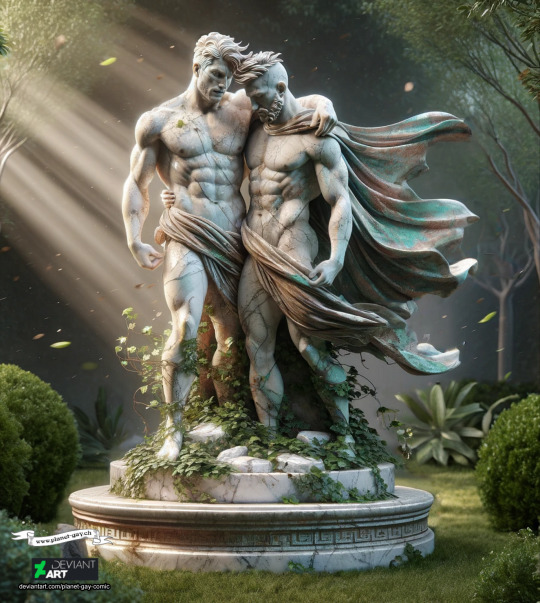
Love Against the Wind
In a world where norms and traditions often dictate the paths of love, there are brave hearts that stand against the wind of expectations. This theme, as timeless as love itself, is reflected in countless stories, some of which have endured through the centuries.
Take the classic example of Romeo and Juliet, the paradigm of forbidden love. Their struggle to maintain their love against familial enmity is a passionate testament to how powerful yet tragic love can be when it contradicts societal norms.
Another profound example is found in Greek mythology. The myth of Hyacinthus and Apollo, a homoerotic love story, demonstrates how love transcends the norms of its time. Apollo, the god of light, and Hyacinthus, a mortal prince, share a love that ends in tragedy. Their story is not only a testimony of their love but also an early example of same-sex affection standing against societal expectations.
In more recent history, we find similar examples. King Edward VIII, who abdicated the British throne to marry Wallis Simpson, a divorced American, shows that even kings are not immune to the challenges of love that crosses societal boundaries. Their love was in direct contradiction to the expectations of society and the church, prompting a king to relinquish his throne.
All these examples are linked by a common thread: the courage to face societal headwinds to remain true to love. Whether it's feuding families, social class differences, or same-sex relationships, history shows us that love is often strongest when it fights against adversity. "Love Against the Wind" is not just a theme of the past but also an ongoing story reflected in the lives of many people around the world.
Text supported by Chat GPT-4
Images generated with DALL-E, overworked with SDXL-1.0 inpainting and composing.
#WarriorsOfLove#Love#Homoerotic#gayart#ancientfetish#gaycomic#gayhistory#marblestatue#gaylove#gayromance#LGBTQ
25 notes
·
View notes
Note
how can i evolve a common verb ending for my infinitives (e.g. portuguese's ar/er/ir infinitives)?
First, you know you don't actually need one, right? Romance languages have them, but not all languages do. In Arabic, for example, the citation form (the first form you see when you open a dictionary) is the third person singular masculine past tense. Now, you might see that and say, "What a weird citation form!" And yeah, if you think about what the form means, you'd be right. But if you look at the forms of the third person singular masculine past tense…
kataba "he wrote"
darasa "he studied"
qara'a "he read"
khabaza "he baked"
laḥasa "he licked"
...you see that the third person singular masculine past tense somehow turns out to be the most basic form of the verb. Every other verb form is more complicated—even the third person feminine singular past tense which is identical to those above with a suffixed -t. Thus it makes perfect sense that if you want to talk about a verb in the abstract you use the third person singular masculine past tense.
When it comes to etymological sources for abstracts or infinitives that aren't simply the base form of the verb, some of my favorites are "time", "way", "method", "path", "play"… Any noun that talks about an instance where a verb happens in a kind of abstract way. You can also use several.
For example, in Zemeni, there's actually a wonderful direct example of a partial paradigm. We're told directly that bes adawa means "to fight". Adawe is the command form that means "fight", and then adawesi is "we fight". This was really exciting, because it painted a picture of what the rest might be like. I made bes adawa mean "do fight", essentially, leaving adawa to mean "a fight" or "fighting" (that's happening right then). Then in addition to that there's dinadawa which means "fighting" in the abstract sense. So, for example, if you said "There's fighting in the market", you'd use adawa, but if you said "Fighting is wrong", you'd say dinadawa. The din- prefixes comes from "time".
So yeah, lots of things you can do or not do! Check Greek. Greek doesn't have any infinitives. They get on fine!
Bonus:
لحس خبز
Laḥasa khubz.
"He licked the bread."
25 notes
·
View notes
Text
I know apollo is supposed to be a paradigm of ancient greek masculinity but he's just such a queen to me
#if he keeps calling himself attractive I'm simply going to imagine him as what i find attractive - camp and effeminate#trials of apollo#lester papadopoulos#toa apollo
90 notes
·
View notes
Note
While researching on different religions that exist in the world, I've finally learned what Shinto is about and now I'm starting to see huge parallels to paganism. One thing that stood out to me especially is the shinto understanding of polytheism/animism. It feels a lot more analog to what I've found out about the "historical" pagan views. Meanwhile, modern neo-pagans seem to draw a lot more inspiration from the ancient greek "flavors" of polytheism. Is this something you've thought about before and do you have any opinions to share about it? I'm really just curious if this is something other heathens have noticed/considered/discussed before.
Oh yeah, we've notice it. This happens for a few reasons:
North American society is modeled after Rome. This means we're prone to viewing Grecco-Roman models of antiquity as "the default" way of doing things, so anytime we don't know how to do something (like polytheism) we look to Roman and Greek things first…even when it doesn't apply.
The Classical Model feels familiar. Familiarity is comfy because it begets a sense of competency, and competency begets a sense of authority, and authority is something many neo-pagans wave around like cudgels to hide the fact they struggle with Christian cognitive paradigms…which they struggle with because Christian operant conditioning needs to actively be deprogrammed, and this is hard to access and hard to do. While no one's at fault for wanting to feel secure in their spirituality, it does lend itself to more corner-cutting.
Neo-Völkisch narratives have poisoned the well. The original Germanic Völkisch movement formed the ideological backbone of the Nazi Party. It also infiltrated Heathenry, giving us Folkish Heathenry. It ALSO romanticized the Roman Empire. The way the Folkish approach Heathenry is to take customs of old Norse culture and slot them into a romanticized Grecco-Roman theological model. It's falling out of favor, for obvious reasons, but a number of people still have the impression this is how Reconstructive Heathenry works.
One thing I will say, for the sake of disambiguation for followers, is that while Heathenry and Shinto are both based in animism, Shinto is a centralized religion whereas Norse Heathenry is not.
60 notes
·
View notes